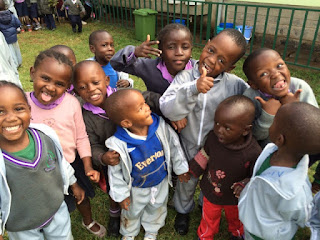As we told you in previous posts, Carol Falk took her family to Little Rock. Following are the impressions of two of her grandchildren and what they have to say about their visit.
First there is Alex's story:
 |
| Alex Falk with Little Rock preschooler |
My name
is Alex Falk. I am nine years old and I live in the U.S.
I recently visited the Little Rock School. I think it is amazing how this
school can bring education to their students of any age.
For example I visited
a class with eighth graders. For some of them they’re here because of a
physical disability. They are here because other schools may have
rejected them because of their disabilities. But Little Rock is open to
everyone!
 |
| Alex with cousin, Heather and Little Rock student |
I also think it’s
amazing how the school makes sure nobody feels mistreated because of their
looks or how they interact with other people.
Seeing this school has
changed my life because seeing all these kids who
have barely anything at home have so much at this school.
Then there is Patrick who had this to say:
 |
| Patrick with Little Rock friend, Lulu |
My name is Patrick
Falk. I’m 14, and somehow I got lucky enough at this age to take a trip to
Kenya with my family. On the second day of the trip, we went to the Little Rock
School just outside of Kibera in Nairobi. Being in an environment with these
children, some of which wouldn’t have been accepted into other schools, was
just incredible. The students were all bright and happy, and so excited to
share their education with us. They loved to take photos and exchange stories,
and they were all so open and kind. My cousins, my sister, and I made quite a
few friends, from toddlers to students in our age groups.
 |
| Lulu likes Patrick's glasses |
Little Rock welcomes
children with open arms, regardless of family situations or disabilities. Seeing
these kids come out of poverty at home, eager to learn and discover, was so
inspiring. It is so, so important to help children around the world get the
education they deserve, and Little Rock is taking a big step for Kibera. This
experience has been life changing, and I am so thankful that I got to visit the
school.

















